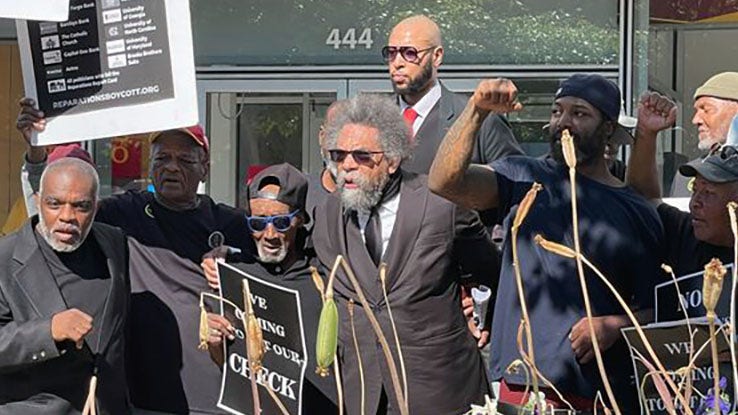Unaffiliated presidential candidate Cornel West recently joined a group of protesters outside Wells Fargo Bank in downtown Washington, D.C., in support of their demands for reparations. West, who originally ran under the People’s Party banner and later decided to run as an Independent, emphasized the importance of reparations in his quest for truth and justice. He highlighted the role of financial institutions in benefiting from slavery and post-Jim Crow injustices, calling for accountability and pressure on those institutions. West’s presence at the protest underscored his commitment to addressing historical injustices and advocating for reparatory compensation.
During the protest, West spoke of the need to hold institutions accountable for their role in benefiting from slavery, specifically mentioning Wells Fargo’s takeover of Wachovia Bank in 2008. Wachovia, a predecessor of Wells Fargo, had ties to owning slaves, which were revealed in a 2005 research project. The protesters at the Wells Fargo picketing aimed to shed light on the banks’ involvement in chattel slavery and the lack of reparations for African Americans who have faced systemic injustices. Comparisons were drawn to examples of governments providing reparations to groups such as Holocaust survivors in Germany and Japanese internment camp prisoners in the U.S., emphasizing the unique struggle African Americans face in seeking compensation for historical wrongs.
The demonstration outside Wells Fargo included calls for reparations from banks that profited from slavery, with protesters expressing their desire for compensation and accountability. Signs with messages like “We’re coming to get our check” were visible, indicating the protesters’ determination to seek reparatory justice. Eyewitnesses reported the presence of a Black nationalist flag among the demonstrators, highlighting the diverse backgrounds and perspectives within the protest. In past years, banks like Wells Fargo have faced legal actions related to discriminatory lending practices towards African American and Hispanic borrowers, signifying ongoing issues of racial inequality in the financial sector.
West’s support for the protest and his advocacy for reparations reflected his long-standing commitment to social justice and truth-seeking. His participation in the demonstration underscored the importance of acknowledging historical injustices and working towards reparatory measures for affected communities. The protesters’ demand for accountability from financial institutions like Wells Fargo for their historical ties to slavery and discrimination resonated with broader discussions around racial justice and reparations in American society. By shining a light on these issues, the protesters aimed to raise awareness and push for meaningful actions to address systemic inequalities and historical injustices.
The demonstration outside Wells Fargo Bank in Washington, D.C. served as a platform for advocating reparations and challenging the financial sector’s historical ties to slavery and discrimination. Cornel West’s presence at the protest added a significant voice to the call for accountability and reparatory justice. The protesters’ demands for compensation for African Americans, who have faced systemic injustices without reparatory measures, underscored the ongoing struggles for racial equality and justice in the United States. This event highlighted the intersection of historical legacies of slavery and ongoing issues of racial inequality in American society, emphasizing the importance of addressing past wrongs and working towards a more just and equitable future.













